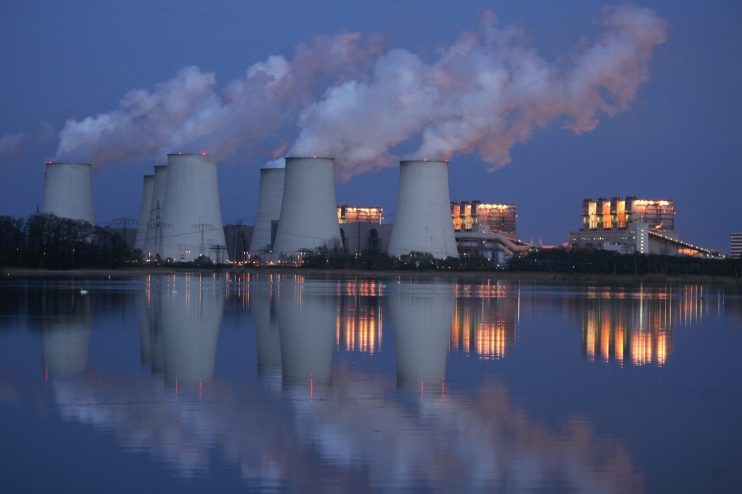Wonks divided over plans to exclude fossil fuel plants from emissions checks

Industry analysts are split over the Government’s reported decision to halt emissions checks on fossil fuel plants, as its scrambles to secure supplies ahead of the cold winter months.
Coal and gas stations providing back-up supply next year will no longer have to get reports on their emissions signed off by an independent expert, according to The Telegraph.
The changes are being proposed by Whitehall officials, with Downing Street desperate to prevent blackouts this winter amid continued disruption of gas flows from Russia into Europe.
There is growing concern the Kremlin will shut off gas into Europe entirely, in retaliation for Western sanctions imposed in response to its invasion of Ukraine.
While there are only three coal-fired power plants still operating in the UK, natural gas remains the cornerstone of the country’s energy mix and remains crucial to meeting people’s energy needs.
Net zero naivety exposed with fossil fuel revival, says IEA
Andy Mayer, energy analyst at free-market think tank, the Institute of Economic Affairs (IEA), argued the latest developments reflected the shortcomings of net zero policies
Mayer said: “Across Europe, net zero naivety is colliding with reality, leading to the return of coal-fired generation and the suspension of policies such as UK emissions checks on those plants. A climate policy, with tight capacity margins from the gas crisis, that risks letting the lights go out and the elderly freeze to death.”
He suggested the lifting of red tape around fossil fuel plants showed the crucial role they still had to play in the energy sector, which typically involves “trade-offs” and compromises, and that the Government should focus on supply and affordability over decarbonisation.
The analyst also called for wider reforms to the country’s energy market, such as suspending the proposed ‘climate compatibility checkpoint’ for oil and gas exploration, triggering the Cost Containment Mechanism for the UK Emissions Trading Scheme, and suspending UK carbon capture trials.
“The former would reduce our reliance on imports of fossil fuels, the second would immediately reduce energy bills, and the third avoids adding further cost and inefficiency to fossil fuel generation at a time when we have no affordable alternative,” he concluded.
Renewables key to supply security, argues green think tanks
Meanwhile, environmental think tanks and organisations criticised the latest move, with Greenpeace UK’s policy director, Doug Parr, suggesting they were reaping the costs from failing to ramp-up domestic renewables.
He said: “Although it’s easy for the government to blame Putin for this backtrack to coal, the UK’s over reliance on fossil fuels comes from years of blocking cleaner, cheaper power.”
Parr also took aim at the government for failing to challenge obstructions to onshore wind power in its supply security strategy, unveiled earlier this year.
He explained: “Had successive Conservative governments not hamstrung onshore renewables then continually refused to remove the planning laws that still block their development to this day, maybe we wouldn’t be so reliant on gas – and now potentially coal – for our electricity.”
Green Alliance’s senior policy adviser, Stuart Dossett likewise spoke out against the plans – noting that coal remains the least environmentally friendly source of energy.
He said: “Postponing the need for the dirtiest fossil fuel power plants to report and verify their carbon emissions should not be allowed to happen. It will inevitably increase carbon emissions and slow down the move to a cleaner, more secure energy system – keeping coal wasn’t part of the recent energy security strategy.”
Commenting on potential solutions to the current crisis, he called for renewables to be ramped up at a greater speed to meet consumer demand, alongside behavioural changes to reduce energy usage.
Dosset said: “To increase energy security and cut consumer energy bills, the focus should be on ramping up new wind and solar fast, improving the energy efficiency of homes, and offering flexibility by paying consumers to shift the times they use energy to when there is lower demand.”
UK races to secure supplies ahead of winter
Fossil fuel facilities bidding to take part in National Grid ESO’s market for back-up power supply have to declare carbon emissions in line with limits.
The Government wants to make it compulsory for these declarations to be independently verified, however there have been delays in getting enough people accredited to do the verification.
Officials are concerned that if independent verification is compulsory, some power plants will be unable to qualify to provide back-up supply for the winter of 2023-2024.
The Telegraph has reported that officials now plan to postpone the requirement to have emissions figures verified for another year, meaning plants should be able to take part in the auction for 2023.
The UK only relies on Russia for four per cent of its gas imports.
However, Russia is Europe’s biggest customer and the UK will find itself in competition with dozens of others for oil and gas from global markets if the Kremlin turns of the taps.
Worst-case scenarios modelled in Whitehall indicate six million households could face black-outs if this winter – which has motivated its recent re-embrace of fossil fuels.
The UK has reached an agreement with EDF earlier this month to extend the life of West Burton Power A Station in Nottinghamshire over the coming winter, and is in talks about extending the two other remaining coal plants operated by Uniper and Drax.
It is also weighing up the potential opening of a new coal mine in Cumbria, and is expected to receive the geological survey on fracking this week – which could pave the way for a revival of the process.
Gas quality rules could also be relaxed to allow more from the North Sea into Britain’s pipes to ensure the country has sufficient flows to match demand.